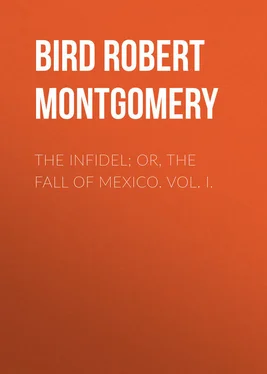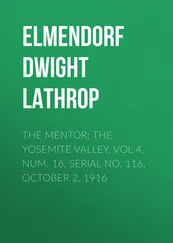Robert Bird - The Infidel; or, the Fall of Mexico. Vol. I.
Здесь есть возможность читать онлайн «Robert Bird - The Infidel; or, the Fall of Mexico. Vol. I.» — ознакомительный отрывок электронной книги совершенно бесплатно, а после прочтения отрывка купить полную версию. В некоторых случаях можно слушать аудио, скачать через торрент в формате fb2 и присутствует краткое содержание. ISBN: , Жанр: foreign_antique, foreign_prose, Историческая проза, на английском языке. Описание произведения, (предисловие) а так же отзывы посетителей доступны на портале библиотеки ЛибКат.
- Название:The Infidel; or, the Fall of Mexico. Vol. I.
- Автор:
- Жанр:
- Год:неизвестен
- ISBN:http://www.gutenberg.org/ebooks/34529
- Рейтинг книги:4 / 5. Голосов: 1
-
Избранное:Добавить в избранное
- Отзывы:
-
Ваша оценка:
- 80
- 1
- 2
- 3
- 4
- 5
The Infidel; or, the Fall of Mexico. Vol. I.: краткое содержание, описание и аннотация
Предлагаем к чтению аннотацию, описание, краткое содержание или предисловие (зависит от того, что написал сам автор книги «The Infidel; or, the Fall of Mexico. Vol. I.»). Если вы не нашли необходимую информацию о книге — напишите в комментариях, мы постараемся отыскать её.
The Infidel; or, the Fall of Mexico. Vol. I. — читать онлайн ознакомительный отрывок
Ниже представлен текст книги, разбитый по страницам. Система сохранения места последней прочитанной страницы, позволяет с удобством читать онлайн бесплатно книгу «The Infidel; or, the Fall of Mexico. Vol. I.», без необходимости каждый раз заново искать на чём Вы остановились. Поставьте закладку, и сможете в любой момент перейти на страницу, на которой закончили чтение.
Интервал:
Закладка:
The Infidel; or, the Fall of Mexico. Vol. I
– Un esforcado soldado, que se dezia Lerma – Se fue entre los Indios como aburrido de temor del mismo Cortes, a quien avia ayudado a salvar la vida, por ciertas cosas de enojo que Cortes contra èl tuvo, que aqui no declaro por su honor: nunca mas supimos del vivo, ni muerto, mala suspecha tuvimos.
Bernal Diaz Del Castillo — Hist. Verd de la Conquista.No hay mal que por bien no venga,
Dicen adagios vulgares.
Calperon — La Dama Duende .CHAPTER I
The traveller, who wanders at the present day along the northern and eastern borders of the Lake of Tezcuco, searches in vain for those monuments of aboriginal grandeur, which surrounded it in the age of Montezuma. The lake itself, which not so much from the saltness of its flood as from the vastness of its expanse, was called by Cortes the Sea of Anahuac, is no longer worthy of the name. The labours of that unhappy race of men, whose bondage the famous Conquistador cemented in the blood of their forefathers, have conducted, through the bowels of a mountain, the waters of its great tributaries, the pools of San Cristobal and Zumpango; and these, rushing down the channel of the Tula, or river of Montezuma, and mingled with the surges of the great Gulf, support fleets of modern argosies, instead of piraguas and chinampas, and expend upon foundering ships-of-war the wrath, which, in their ancient beds, was wasted upon reeds and bulrushes. With the waters, which rippled through their streets, have vanished the numberless towns and cities, that once beautified the margin of the Alpine sea; the towers have fallen, the lofty pyramids melted into earth or air, and the palaces and tombs of kings will be looked for in vain, under tangled copses of thistle and prickly-pear.
The royal city of Tezcuco is now, though the capital of a republican state, a mean and insignificant village. It was originally the metropolis of a kingdom once more ancient and powerful than that of Mexico; and which, when it had shared the fate of all others within the bounds of Anahuac, and acknowledged the sway of the Island Kings, still preserved the reputed, and perhaps the real possession of superior civilization. Its princes, in becoming the feudatories, became also the electors, of Mexico; and thus added dignity to an independence which was only nominal. The polished character of these barbarous chieftains, as the world has been taught to esteem them, may be better understood, when we know, that they sowed the roadside with corn for the sustenance of travellers, and the protection of husbandmen, built hospitals and observatories, endowed colleges and formed associations of literature and science, in which, to compare small things with great, as in the learned societies of modern Europe and America, encouragement was given to the study of history, poetry, music, painting, astronomy, and natural magic. The various mechanical trades were divided into corporate bodies, and assigned, each, to some particular quarter of the city; courts and councils were regularly established, and the laws which they dispensed, digested into uniform and written codes, some of which are still preserved. The kings of Tezcuco themselves mingled in the generous rivalries which they fomented: there are still in existence, – at least, in the form of translation, – several of the odes of Nezahualcojotl, a royal Tezcucan poet; and his hymns to the Creator, composed half a century before the advent of the Spaniards, were admired and chanted by the Conquerors, until devoted by misjudging and fanatical missionaries to the flames which consumed the written histories and laws of the kingdom, as well as the idolatrous rituals of the priests, with which last the others were unfortunately confounded. 1 1 These poems, we presume, were handed down orally . We know not how far the picture-writing of the Mexicans (the art of interpreting which appears to be now lost,) was capable of conveying any such thoughts as could not be represented by an absolute portrait . No system of writing that is not essentially phonetic or dialectical , (i. e. representative of sounds, or of language,) can be made to express abstract ideas, which may be defined to be such as admit of no ideographic or metaphoric representation. If they could, mankind might, at once, enjoy the benefits of the universal language , (or, to speak strictly, a substitute for it; for it would convey ideas not words,) which Leibnitz dreamed of, and Bishop Wilkins, and many others after him, so vainly attempted to construct. When, therefore, we relate any very curious and marvellous matters, appertaining to Mexican literature , though we speak upon the authority of historians, we invite the reader to receive our accounts with some grains of allowance. With the exception of a few arbitrary symbols, expressive of numerals, and a few other objects of constant recurrence, the picture-writing of Mexico spoke in ideas, not words; and it may therefore be assumed, that it could express nothing that did not, or by a stretch of ingenuity, could not be made to, address and explain itself to the eye.
A few ruins – a cluster of dilapidated houses – a galloping Creole on his high Spanish saddle, with glittering manga and rattling anquera , – and, now and then, an Indian skulking moodily along, in his squalid serape , 2 2 The Manga and Serape are Mexican cloaks worn scapulary-wise, the one of richly embroidered cloth, the other of blanket, or some such coarse material. The Anquera is a leather housing, embossed and gilt, with a jingling fringe of brass or silver ornaments.
– are all that remain of Tezcuco.
In the spring of 1521, the year that followed the flight of the Spaniards from Mexico, the city of the Acolhuacanese presented all its grandeur of aspect, and, to the eye, looked full as royal and imperishable as in the best days of its freedom. But the molewarp was digging at its foundations; and the cloud which had ravaged the Mexican valley, and then passed away into the east, where it lay for a time still and small, 'like to a man's hand,' had again crept over the mountain barriers to its gates, and was now brooding among its sanctuaries. A group of Christian men sat under a cypress-tree, without the walls, regarding the great pyramid, on whose lofty terrace, overshadowing the surrounding edifices, floated a crimson banner of velvet and gold, on which, besides the royal arms of Spain, was emblazoned, as on the Labarum of the Constantines, a white cross, with the legend, imitated from that famous standard of fanaticism, In hoc signo vincemus . If other proof had been wanting of the return of the Spaniards to the scene of their discomfiture, their presence in Tezcuco, and their unchangeable resolution to complete the work of conquest so disastrously begun, it might have been traced abundantly in the strange spectacle, which, equally with the desecrated temple, divided the attention of the group of Castilians at the cypress-tree. They sat on a little swell of earth, – a natural mound which jutted into the lake, whose waters, agitated by a western breeze, dashed in musical breakers at its base; while the rustling of the leaves above, mingled with these sounds of waves, a tone that was both melancholy and harmonious. The beautiful prospect of Tezcuco, rising beyond fertile meadows in the livery of spring, flanked, on the right hand, by a sheet of dark and glossy water, – with white towers, turrets, and temple-tops, painted, as it seemed, on a background of mountains of the purest azure, was enough of itself to engross the admiration of a looker-on, had there not been presented, hard by, a scene still more singular and romantic.
A train of warriors, artificers and labourers, the latter bending under such burthens as had never before descended to the verge of Tezcuco, was seen passing, at a little distance, towards the city, into which, as was denoted by a sudden explosion of artillery and the blast of trumpets on the top of the pyramid, the leaders were just entering, while the rear of the procession, extending for miles, and winding like some mighty snake, over hill and meadow, was lost among distant forests.
Читать дальшеИнтервал:
Закладка:
Похожие книги на «The Infidel; or, the Fall of Mexico. Vol. I.»
Представляем Вашему вниманию похожие книги на «The Infidel; or, the Fall of Mexico. Vol. I.» списком для выбора. Мы отобрали схожую по названию и смыслу литературу в надежде предоставить читателям больше вариантов отыскать новые, интересные, ещё непрочитанные произведения.
Обсуждение, отзывы о книге «The Infidel; or, the Fall of Mexico. Vol. I.» и просто собственные мнения читателей. Оставьте ваши комментарии, напишите, что Вы думаете о произведении, его смысле или главных героях. Укажите что конкретно понравилось, а что нет, и почему Вы так считаете.












